Coffee machines have evolved significantly‚ offering two main types: automatic and manual. Automatic machines provide convenience and consistency‚ while manual ones offer control and customization. Both cater to different preferences‚ ensuring the perfect brew for every coffee lover.
Overview of Automatic and Manual Coffee Machines
Automatic coffee machines use advanced technology to automate the brewing process‚ offering convenience and speed. They often feature preset controls‚ allowing users to customize settings like strength and cup size. Manual coffee machines‚ on the other hand‚ require hands-on operation‚ such as grinding beans‚ tamping‚ and brewing‚ giving users full control over the process. While automatic machines are ideal for busy individuals seeking ease‚ manual machines cater to coffee enthusiasts who value precision and the art of brewing. Both types aim to deliver high-quality coffee but cater to different lifestyles and preferences.
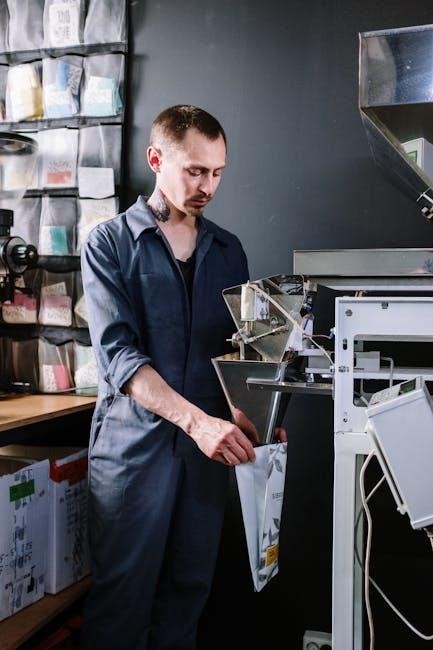
Importance of Choosing the Right Coffee Machine
Selecting the right coffee machine is crucial for ensuring a perfect brew and long-term satisfaction. Automatic machines save time and effort‚ making them ideal for busy schedules‚ while manual machines offer precision and control‚ appealing to coffee enthusiasts. The choice impacts daily routines‚ space‚ and budget‚ influencing overall coffee enjoyment. By aligning the machine type with lifestyle and preferences‚ users can enhance their coffee experience‚ ensuring every cup meets their expectations for flavor and convenience;
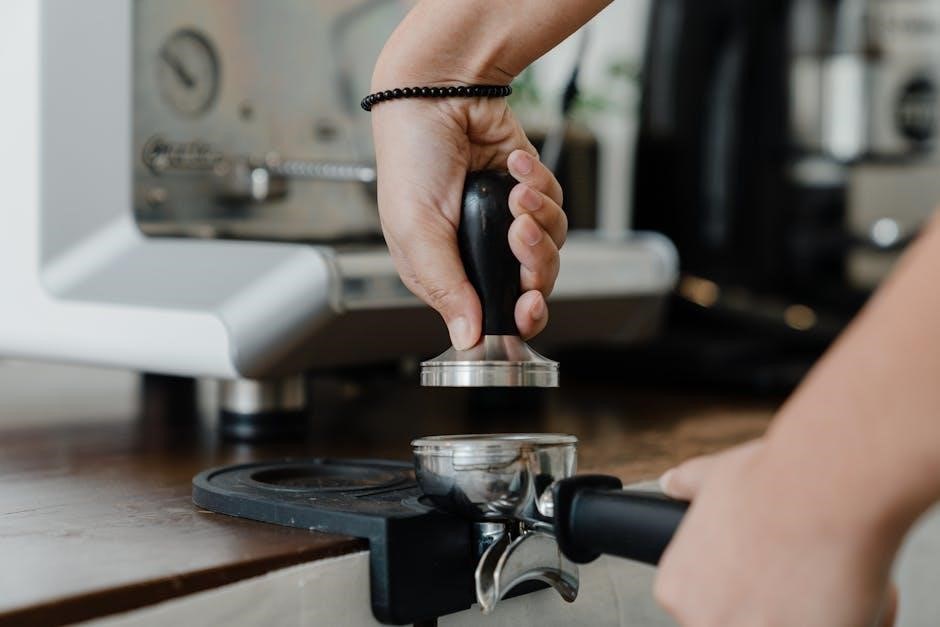
Differences in Functionality
Automatic coffee machines automate grinding‚ brewing‚ and temperature control‚ offering convenience. Manual machines require hands-on operation‚ allowing customization. Each caters to different user preferences and skill levels‚ ensuring tailored coffee experiences.
How Automatic Coffee Machines Work
Automatic coffee machines streamline the brewing process‚ handling tasks like grinding beans‚ heating water‚ and controlling temperature. Users select settings‚ and the machine executes the process seamlessly. Advanced models offer features like milk frothing and customizable drink options‚ ensuring a convenient and consistent experience. These machines are designed for efficiency‚ minimizing manual effort while delivering high-quality results. They cater to those seeking ease of use and precision‚ making them ideal for busy individuals or those new to coffee brewing. The automation ensures uniformity in flavor and temperature‚ providing a reliable coffee experience every time.
How Manual Coffee Machines Work
Manual coffee machines require hands-on involvement‚ offering users full control over the brewing process; They typically involve grinding coffee beans‚ boiling water‚ and manually pouring the water over the grounds in a filter or directly into a pot. This method allows for precise adjustment of parameters like water temperature‚ coffee-to-water ratio‚ and steeping time. Manual machines often lack automation‚ making them more affordable and portable. Enthusiasts appreciate the tactile experience and the ability to tailor every step to their preference‚ resulting in a highly customizable and often superior-quality cup of coffee. The process demands effort but rewards with a deeper connection to the craft of brewing.
Key Functional Differences Between the Two
The primary distinction lies in automation level. Automatic machines streamline brewing with preset controls‚ minimizing manual effort‚ while their manual counterparts require active participation. Automatics often include features like grinders and milk frothers‚ enhancing convenience. Manuals‚ however‚ offer unparalleled control over brewing parameters. Space and portability are also factors—manual machines are generally compact and lightweight‚ whereas automatics can be bulkier and less portable. Maintenance differs too‚ with automatics needing regular descaling and part replacements‚ unlike manuals. These differences cater to contrasting lifestyles‚ making each type ideal for specific user preferences and needs‚ ensuring a tailored coffee experience.

User Experience and Convenience
Automatic machines offer effortless operation with preset controls‚ ideal for quick brewing. Manual machines require hands-on involvement‚ appealing to enthusiasts who value the craft and precision of brewing.
Ease of Use: Automatic vs Manual
Automatic coffee machines are designed for simplicity‚ with preset controls and one-touch operation‚ making them ideal for quick and hassle-free brewing. Manual machines‚ while requiring more effort‚ offer a hands-on experience that appeals to coffee enthusiasts. Automatic machines minimize human error and save time‚ perfect for busy schedules. Manual machines‚ however‚ provide greater control over brewing parameters‚ allowing for customization. The choice depends on whether convenience or craftsmanship is prioritized; Automatic machines are user-friendly‚ while manual ones cater to those who enjoy the process and precision of traditional brewing methods.
Customization Options in Automatic Machines
Automatic coffee machines often feature advanced customization options‚ allowing users to tailor their brewing experience. Many models offer adjustable settings for brew strength‚ temperature‚ and cup size‚ ensuring a personalized cup every time. Some high-end machines include milk frothing systems‚ enabling the creation of lattes and cappuccinos with ease. Additionally‚ programmable timers and memory functions let users save their preferred settings for convenience. These features make automatic machines versatile‚ catering to a variety of tastes and preferences without compromising on ease of use. Customization options enhance the user experience‚ making automatic machines a popular choice for coffee lovers seeking convenience and flexibility.
The Manual Brewing Process: Steps and Requirements
Manual coffee brewing involves a hands-on process that requires precision and attention to detail. It typically starts with grinding coffee beans to the desired coarseness‚ followed by boiling fresh water. The grounds are then placed in a brewing device‚ such as a French press or pour-over‚ and hot water is poured over them. After steeping for a few minutes‚ the coffee is separated from the grounds‚ either by pressing or draining. This method demands patience and practice to perfect but offers a high level of control over flavor and texture‚ appealing to enthusiasts who value craftsmanship and a rich‚ nuanced brew.
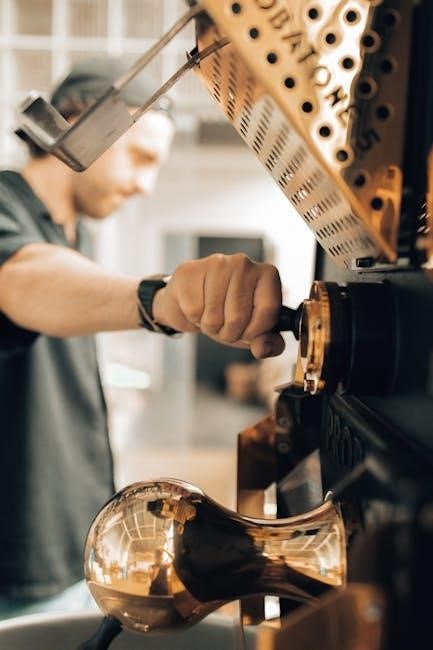
Maintenance and Upkeep
Maintenance varies between automatic and manual machines. Automatic machines require regular descaling and filter replacements‚ while manual machines need only rinsing and drying‚ making them lower maintenance overall.
Cleaning and Maintaining Automatic Coffee Machines
Automatic coffee machines require regular maintenance to ensure optimal performance. Descaling is essential to remove mineral buildup from water‚ which can affect taste and machine longevity. Water filters should be replaced periodically to maintain water quality. Cleaning the brew head‚ drip tray‚ and grinds container is necessary to prevent bacterial growth and odors. Many machines have self-cleaning cycles‚ but manual rinsing is still recommended. Proper upkeep ensures consistent flavor‚ prevents clogs‚ and extends the machine’s lifespan. Regular cleaning also reduces the risk of mold and scale damage‚ making it a crucial part of owning an automatic coffee machine.
Care and Maintenance for Manual Coffee Machines
Manual coffee machines demand consistent care to maintain brewing quality. Regularly rinse and dry components like the French press plunger or pour-over drippers to prevent residue buildup. Glass and ceramic parts should be hand-washed with mild detergents to avoid scratches. Metal components may require occasional descaling‚ especially in hard water areas. Store equipment in a dry place to prevent mold. Unlike automatic machines‚ manual devices often lack complex systems‚ making cleaning simpler. Proper maintenance ensures longevity and preserves the nuanced flavors of manually brewed coffee‚ keeping the brewing process enjoyable and effective for years to come.
Cost of Maintenance: Automatic vs Manual
Automatic coffee machines generally have higher maintenance costs due to their complex internal systems. Descaling‚ replacement parts‚ and occasional professional servicing can add up over time. Manual machines‚ while simpler‚ require less investment in upkeep‚ with costs limited to periodic replacement of basic components like filters or gaskets. However‚ manual machines may demand more effort for regular cleaning. Overall‚ manual machines are typically more budget-friendly in the long run‚ whereas automatic machines‚ despite their convenience‚ incur higher maintenance expenses‚ especially for high-end models with advanced features.
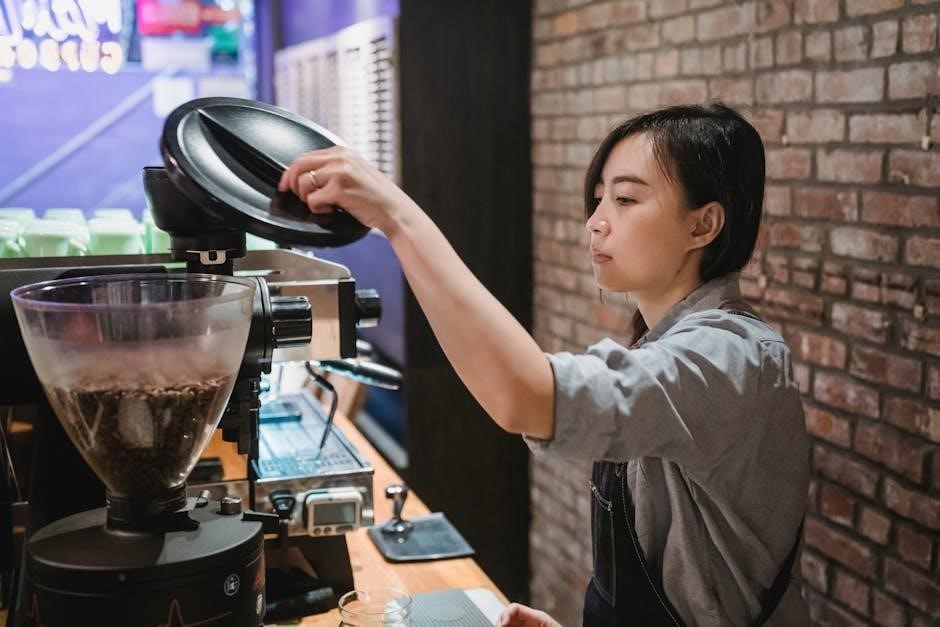
Cost Considerations
Automatic coffee machines often have higher initial and long-term costs due to advanced features and maintenance needs. Manual machines are generally more affordable and require less upkeep‚ making them a budget-friendly choice for many coffee enthusiasts.
Initial Purchase Cost: Automatic vs Manual
Automatic coffee machines typically have a higher initial purchase cost‚ ranging from a few hundred to several thousand dollars‚ depending on features and brand. Manual machines are generally more affordable‚ with prices starting from under $100 for basic models up to around $500 for high-end manual brewers. The cost difference is largely due to the advanced technology and automation in automatic machines‚ which offer features like programmable settings and built-in grinders. Manual machines‚ on the other hand‚ rely on manual effort and simpler designs‚ making them a more budget-friendly option for coffee enthusiasts or those with limited funds.
Long-Term Costs: Coffee‚ Maintenance‚ and Repair
Long-term costs for automatic and manual coffee machines vary significantly. Automatic machines often require descaling and part replacements‚ increasing maintenance expenses. They also consume more coffee beans due to their automated brewing process. Manual machines‚ while needing occasional replacement of filters or gaskets‚ generally have lower maintenance costs. Additionally‚ manual brewing typically uses less coffee per serving. Repair costs for automatic machines can be high if advanced components like pumps or control panels fail. In contrast‚ manual machines are simpler‚ with fewer components prone to failure‚ making them more cost-effective over time. Balancing these factors helps determine the most economical choice.
Budget-Friendly Options: Manual vs Automatic
Manual coffee machines are generally more budget-friendly than automatic ones. They often require a one-time purchase with minimal additional costs. Automatic machines‚ while convenient‚ typically have higher initial prices and ongoing expenses like descaling and maintenance. Manual brewers‚ such as French presses or pour-overs‚ are affordable and durable‚ making them ideal for those on a tight budget. However‚ some entry-level automatic machines are available at lower prices‚ though they may lack advanced features. Overall‚ manual machines remain the most cost-effective option for budget-conscious users seeking quality coffee without financial strain.

Lifestyle and Usage
Your lifestyle and usage habits play a crucial role in choosing between automatic and manual coffee machines. Busy individuals often prefer automatic machines for quick brewing‚ while coffee enthusiasts may enjoy the manual process for better control over flavor and texture.
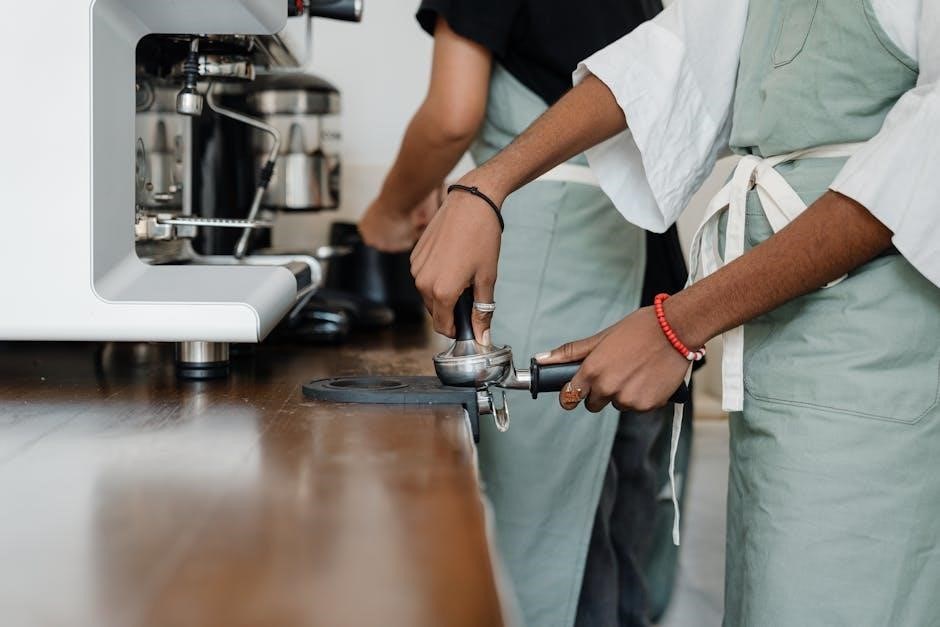
Best Machine for Busy Schedules
For individuals with hectic lifestyles‚ automatic coffee machines are ideal due to their speed and ease of use. They allow users to brew high-quality coffee quickly‚ with minimal effort required. Many automatic machines come with pre-set options‚ enabling users to customize their coffee preferences without sacrificing time. Manual machines‚ while offering precision‚ require more time and effort‚ making them less practical for rushed mornings. Automatic machines are perfect for those who value convenience and efficiency‚ ensuring a great cup of coffee even when time is scarce. Portability and compact designs further enhance their appeal for busy households.
Best Machine for Coffee Enthusiasts
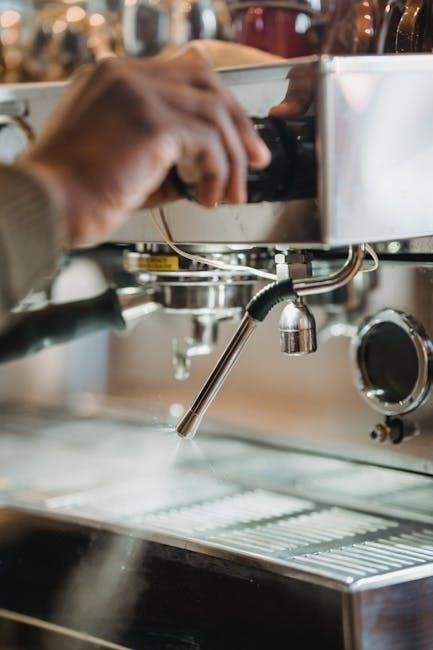
For coffee enthusiasts‚ manual coffee machines are often the preferred choice‚ as they allow for precise control over brewing parameters such as temperature‚ grind size‚ and extraction time. This level of customization enables users to experiment with different coffee beans and techniques‚ creating a highly personalized brewing experience. While automatic machines offer convenience‚ manual machines cater to those who appreciate the art and science of coffee-making. The hands-on process and ability to fine-tune every step make manual machines ideal for enthusiasts seeking to elevate their coffee game and explore the full potential of their favorite brews.
Space and Portability: Manual vs Automatic
Manual coffee machines are generally more compact and lightweight‚ making them ideal for small spaces or travel. They require minimal setup and can be easily stored or transported. Automatic machines‚ while convenient‚ tend to be bulkier and heavier‚ often requiring more counter space. Their built-in grinders and water reservoirs add to their size‚ making them less portable. However‚ some automatic machines are designed to be compact‚ balancing functionality with space efficiency. For those prioritizing portability‚ manual machines are the clear winner‚ while automatic machines suit stationary use in homes or offices with ample space.
Choosing between automatic and manual coffee machines depends on your lifestyle‚ preferences‚ and needs. Both offer unique benefits‚ ensuring the perfect brew tailored to your daily routine.
Final Thoughts on Choosing the Right Machine
Ultimately‚ the choice between an automatic and manual coffee machine hinges on your lifestyle and preferences. Automatic machines excel in convenience and consistency‚ making them ideal for busy individuals who value ease of use. On the other hand‚ manual machines offer unparalleled control and customization‚ catering to coffee enthusiasts who enjoy the hands-on brewing process. Consider factors like time availability‚ desired brew quality‚ and maintenance preferences to make an informed decision. Whichever you choose‚ both types promise to elevate your coffee experience‚ ensuring every sip is tailored to your taste.
Recommendations Based on User Preferences
For those prioritizing convenience and speed‚ automatic coffee machines are the top choice‚ delivering consistent results with minimal effort. Coffee enthusiasts seeking precise control and a personalized brewing experience should opt for manual machines. Busy individuals with limited time will appreciate the efficiency of automatic models‚ while those who value the art of brewing and are willing to invest time will find manual machines rewarding. Consider your budget‚ space‚ and daily coffee habits to select the machine that best aligns with your lifestyle and preferences for an optimal brewing experience.